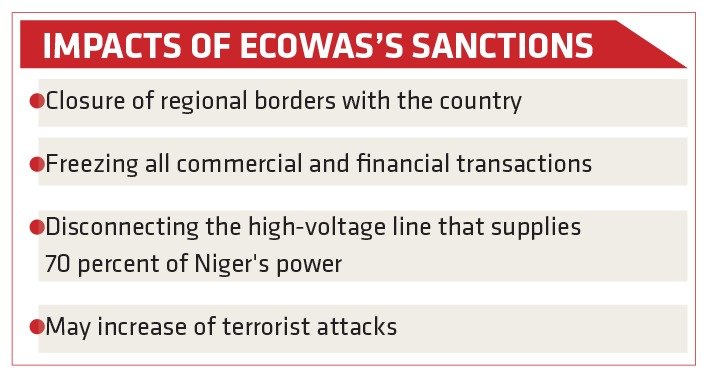The Economic Community of West African States (ECOWAS) has dispatched a delegation to Niger to engage in negotiations with the military officials who orchestrated the recent coup. This move comes after the regional bloc imposed sanctions on Niger and expressed its willingness to authorise the use of force if the coup leaders fail to reinstate President Mohamed Bazoum within a week from last Sunday.
Abdel-Fatau Musah, ECOWAS commissioner for political affairs, peace, and security, emphasised that the military option is the last resort and that preparations are being made for any eventualities. He stated that it is essential to demonstrate the bloc’s ability to take decisive action when required.
You can also read: Trump indicted for bid to overturn 2020 election
Former Nigerian military leader Abdulsalami Abubakar is leading the delegation to Niger and is expected to commence talks with the military government in Niamey. The details of the mission have not been fully disclosed yet.
Extremist threats and regional stability at stake
The current military government in Niger is headed by General Abdourahmane Tchiani, the former head of President Bazoum’s presidential guard, who detained the president in his palace on July 26 and subsequently declared himself the head of state.
ECOWAS has encountered challenges in maintaining democratic stability within the region, as several member states, including Mali, Burkina Faso, and Guinea, have experienced coups over the past two years, with an attempted coup in Guinea-Bissau as well. The bloc has taken a tough stance against Niger, implementing various sanctions, including the closure of regional borders with the country.

The economic sanctions imposed by ECOWAS on Niger following the coup have included freezing all commercial and financial transactions between member states and Niger. This move has significant implications for Niger, which is already one of the world’s poorest nations, often ranking last on the United Nations Human Development Index. The sanctions have led to neighboring Nigeria disconnecting the high-voltage line that supplies 70 percent of Niger’s power, further exacerbating the country’s challenges.
The coup in Niger has sparked concerns among neighbouring countries, especially Mali and Burkina Faso, both still under military rule. They have warned that any intervention in Niger would be considered a declaration of war against them as well. Niger is a crucial ally in the fight against armed groups in the region, and foreign powers have condemned the coup, fearing that it could allow extremist groups to gain ground.
Notably, France, the United States, Germany, and Italy have stationed troops in Niger for anti-rebel and training missions to support the fight against groups linked to al-Qaeda and ISIS. So far, there have been no announcements of troop withdrawal, and German authorities have expressed confidence in the safety of their soldiers in the region.
Despite the reopening of Niger’s land and air borders with neighboring countries, the key entryways for trade and commerce remain closed due to ECOWAS-imposed restrictions. The situation remains complex and sensitive, with regional stability and security at stake.
Zero tolerance’ for coup leaders
Days before, leaders from the Economic Community of West African States (ECOWAS) held crisis talks in Nigeria’s capital, Abuja, to address the latest coup in Niger. After the summit, a statement was issued, expressing ECOWAS’s “zero tolerance” for coups and warning that the bloc would take all necessary measures to restore constitutional order in Niger within a week. These measures could include the use of force, and military chiefs are set to convene immediately to plan a potential intervention.
Dr. Leonardo Santos Simao, the Special Representative and Head of the United Nations Office for West Africa and the Sahel, was present at the meeting and stated that ECOWAS took decisive action due to concerns about Niger’s crucial role in fighting terrorism. The region’s stability is at risk, and if Niger were to cease playing this role, it could provide more opportunities for terrorists to expand in the area. However, no official negotiations were taking place between ECOWAS and the military junta in Niger.
This was the first time that ECOWAS has threatened military action to counter coups in the region, but in the past, the bloc has sanctioned military intervention. In 2017, Senegalese troops were deployed to The Gambia to remove President Yahya Jammeh from office after he refused to accept election defeat.
In response to the coup, Chad’s President Mahamat Idriss Déby Itno traveled to Niamey to urge the junta to step down. West African leaders have also imposed a no-fly zone over Niger for all commercial flights, closed all land borders with the country, and imposed financial sanctions against the junta.
The coup in Niger has raised concerns that the country, a former French colony, might pivot towards Russia. The ousted president had collaborated closely with both regional and Western nations to combat militant Islamists. Burkina Faso and Mali also moved closer to Russia after their own coups.
In response to the coup, protesters outside the French embassy in Niamey chanted pro-Russian slogans and set fire to the embassy walls, raising concerns about potential attacks on French interests in Niger.
The coup has been condemned by Western nations, but Yevgeny Prigozhin, the leader of Russia’s Wagner mercenary group, reportedly welcomed it. Prigozhin described it as a triumph, characterizing it as the people of Niger struggling against their colonizers.
France had announced the withdrawal of its troops from Mali amid tension with the junta and has shifted its regional military headquarters to Niger. Mali’s junta also ordered the departure of the UN’s 12,000 peacekeepers. ECOWAS’ decisive actions in imposing sanctions have been welcomed by countries like the UK, with the British Foreign Secretary expressing strong support for democracy and ECOWAS’ commitment to it. However, any Western military intervention to restore democracy has been ruled out by some foreign leaders, as it could be perceived as a new form of colonisation.


